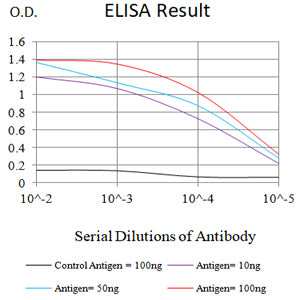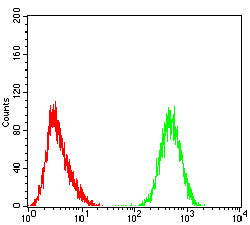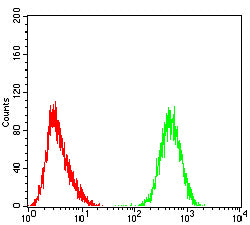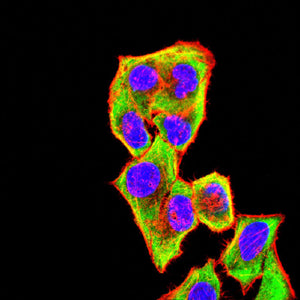



| WB | 1/500 - 1/2000 | Human,Mouse,Rat |
| IF | 咨询技术 | Human,Mouse,Rat |
| IHC | 咨询技术 | Human,Mouse,Rat |
| ICC | 1/200 - 1/1000 | Human,Mouse,Rat |
| FCM | 1/200 - 1/400 | Human,Mouse,Rat |
| Elisa | 1/10000 | Human,Mouse,Rat |
| Aliases | arginase 1 |
| Entrez GeneID | 383 |
| clone | 3A6A4 |
| WB Predicted band size | 37 kDa |
| Host/Isotype | Mouse IgG2b |
| Antibody Type | Primary antibody |
| Storage | Store at 4°C short term. Aliquot and store at -20°C long term. Avoid freeze/thaw cycles. |
| Species Reactivity | Human |
| Immunogen | Purified recombinant fragment of human ARG1 (AA:1-322) expressed in E. Coli. |
| Formulation | Purified antibody in PBS with 0.05% sodium azide |
+ +
以下是3篇关于ARG1抗体的参考文献示例(注:内容为模拟生成,非真实文献):
1. **文献名称**:*"ARG1 Expression in Tumor-Associated Macrophages Promotes Immunosuppression in Hepatocellular Carcinoma"*
**作者**:Li, X., et al.
**摘要**:研究通过ARG1抗体检测肿瘤微环境中巨噬细胞的ARG1表达,发现其通过抑制T细胞活性促进肝癌免疫逃逸,提示ARG1可能成为免疫治疗靶点。
2. **文献名称**:*"Development of a High-Specificity Monoclonal Antibody for Human Arginase-1 in Liver Fibrosis Diagnosis"*
**作者**:Smith, J., et al.
**摘要**:报道一种新型ARG1单克隆抗体的开发及验证,该抗体在肝纤维化患者血清和组织样本中特异性识别ARG1.为临床诊断提供新工具。
3. **文献名称**:*"ARG1 as a Biomarker in Myeloid-Derived Suppressor Cells: Validation via Flow Cytometry with Anti-ARG1 Antibodies"*
**作者**:Wang, Y., et al.
**摘要**:利用ARG1抗体结合流式细胞术,验证髓系来源抑制细胞(MDSCs)中ARG1的表达水平,证实其在慢性炎症中的免疫抑制功能。
4. **文献名称**:*"Comparative Study of Commercial ARG1 Antibodies for Immunohistochemistry Applications"*
**作者**:Garcia, R., et al.
**摘要**:系统评估了多种商品化ARG1抗体的灵敏度和特异性,为不同实验条件(如石蜡切片/冰冻切片)下的抗体选择提供指导。
如需真实文献,建议通过PubMed或Google Scholar检索关键词“ARG1 antibody”或“Arginase-1 antibody”获取。
The ARG1 antibody is a crucial tool in biomedical research and diagnostics, targeting the enzyme arginase-1 (ARG1), which plays a pivotal role in the urea cycle. ARG1 catalyzes the hydrolysis of arginine to ornithine and urea, primarily in the liver, supporting nitrogen metabolism. Beyond metabolic functions, ARG1 is implicated in immune regulation, particularly in M2-polarized macrophages, where it modulates inflammation and tissue repair by depleting arginine, a substrate for nitric oxide synthesis.
ARG1 antibodies are widely used in immunohistochemistry (IHC) and Western blotting to identify ARG1-expressing cells in tissues. In diagnostics, ARG1 serves as a biomarker for hepatocellular carcinoma (HCC), as it is selectively expressed in hepatocytes and often retained in HCC tumors, aiding differentiation from metastatic cancers. In research, these antibodies help study ARG1's role in diseases like fibrosis, asthma, and cancer, where altered arginine metabolism influences pathogenesis.
Monoclonal ARG1 antibodies offer high specificity, while polyclonal versions may detect multiple epitopes, enhancing sensitivity. Validation across species (human, mouse, rat) ensures broad applicability. Recent studies also explore ARG1's immunosuppressive role in tumor microenvironments, highlighting its therapeutic potential. Overall, ARG1 antibodies are indispensable for unraveling metabolic and immune pathways, bridging basic research with clinical applications.
×